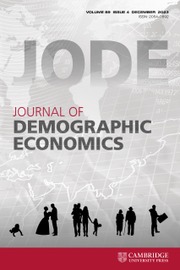-
- Get access
- Contains open access
- ISSN: 2054-0892 (Print), 2054-0906 (Online)
- Editor: Professor David de la Croix Université Catholique de Louvain, Belgium
- Editorial board
Demographic variables such as fertility, mortality, migration and family structures notably respond to economic incentives and in turn affect the economic development of societies. Journal of Demographic Economics welcomes both empirical and theoretical papers on issues relevant to Demographic Economics with a preference for combining abstract economic or demographic models together with data to highlight major mechanisms.
The journal was first published in 1929 as Bulletin de l’Institut des Sciences Economiques. It later became known as Louvain Economic Review, and continued till 2014 to publish under this title. In 2015, it moved to Cambridge University Press, increased its international character and changed its focus exclusively to demographic economics. The journal will become fully Gold Open Access with the 2026 Volume, and all papers accepted after March 10, 2025 will be published on an Open Access basis.
Don’t miss the 2020 special issue on the economics of religion
Read a blog post from special issue Editor Jared Rubin introducing the issue and the 7 articles it contains.
Click here to go to the issue.
Latest content
Economics blog

-
Spillover effects of financial education
- 04 April 2025,
- Veronica Frisancho, Chief Economist at CAF (Development Bank of Latin America and the Caribbean) answers our questions about her award winning article “Spillover...

-
Meet the Editors: Tristan R. Grunow and Mary M. McCarthy, Editors for Asia-Pacific Journal
- 17 March 2025,
- We are pleased to introduce ourselves to the Cambridge Core family as the co-editors of Asia-Pacific Journal: Japan Focus. Tristan is a professor of modern...

-
New to Cambridge in 2025: Experimental Economics and JESA
- 12 December 2024,
- Cambridge University Press is pleased to announce that it will publish Experimental Economics and the Journal of the Economic Science Association (JESA) from...


